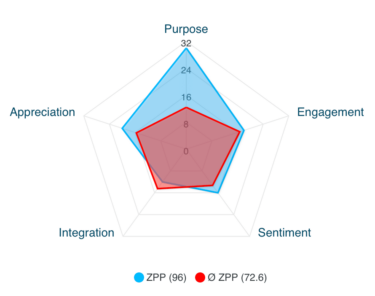How do you measure happiness?
Scientific instruments to measure happiness
A surprisingly large share of scientific instruments to measure happiness are surveys with exactly one question, literally just asking about happiness. In the case of the European Social Survey (ESS), the question reads: ‘Taking all things together, how happy would you say you are?’. The simplicity is convincing and the results are likely reliable, though for a deeper understanding of the drives for happiness, a single question will not suffice. More extensive measurements of happiness either fail to satisfy scientific quality criteria, don’t allow to for individual recommendations or are so time-consuming and complex to complete that they are not suitable to be used in practice
The zentor Purpose Score
We developed our very own zentor® Purpose Score (ZPS), a scientifically validated instrument to measure happiness based on our zentor model for a fulfilling life. With only few questions, the ZPS allows for valid insights about the current emotional state and the development over time. In addition, if allows to infer clues with regard to the sources (derived from hapiness research) for a fulfilling life and enable to deliver individual, evidence-based recommendations. The ZPS captures both, eudaimonic sources of happiness, such as purpose, engagement, and appreciation and also factors in hedonistic components. In collaboration with our research partnern e.g. TU Munich and LMU Munich we continously refine all our approaches.
Test the Purpose Score for yourself:
You can find more details about the scientific validation of the zentor® Purpose Score in collaboration with the Technical University Munich in this blog article. If you’re interested in even more information about the development and scientific basis of the zentor zentor Purpose Score, please check out more articles on zentor insights here und here.
